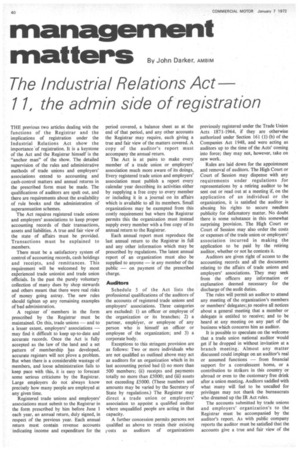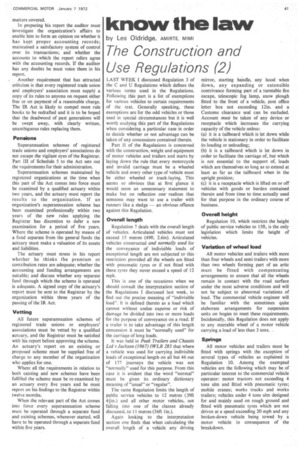management
Page 38

Page 39

If you've noticed an error in this article please click here to report it so we can fix it.
matters By John Darker, MOW
The Industrial Relations Act 11, the admin side of registration
THE previous two articles dealing with the functions of the Registrar and the implications of registration under the Industrial Relations Act show the importance of registration. It is a keystone of the Act and the Registrar himself is the "anchor man" of the show. The detailed supervision of the rules and administrative methods of trade unions and employers' associations extend to accounting and cash-control matters and annual returns in the prescribed form must be made. The qualifications of auditors are spelt out, and there are requirements about the availability of rule books and the administration of superannuation schemes.
The Act requires registered trade unions and employers' associations to keep proper accounting records of their transactions, assets and liabilities. A true and fair view of the state of affairs must be provided. Transactions must be explained to members.
There must be a satisfactory system of control of accounting records, cash holdings and 'receipts, and remittances. This requirement will be welcomed by most experienced trade unionist and trade union officials. In the past the purely voluntary collection of many dues by shop stewards and others meant that there were real risks of money going astray. The new rules should tighten up any remaining examples of bad administration.
A register of members in the form prescribed by the Registrar must be maintained. On this, trade unions — and to a lesser extent, employers' associations — may find it difficult to keep up-to-date and accurate records. Once the Act is fully accepted as the law of the land and a set pattern of membership has developed, accurate registers will not prove a problem. But when there is a considerable wastage of members, and loose administration fails to keep pace with this, it is easy to forecast some serious criticisms by the Registrar. Large employers do not always know precisely how many people are employed at any given time.
Registered trade unions and employers' associations must submit to the Registrar in the form prescribed by him before June 1 each year, an annual return, duly signed, in respect of the previous year. Each annual return must contain revenue accounts indicating income and expenditure for the period covered, a balance sheet as at the end of that period, and any other accounts the Registrar may require, each giving a true and fair view of the matters covered. A copy of the auditor's report must accompany the annual return.
The Act is at pains to make every member of a trade union or employers' association much more aware of its doings, Every registered trade union and employers' association must publish a report every calendar year describing its activities either by supplying a free copy to every member or including it in a journal on its affairs which is available to all its members. Small organizations may be exempted from this costly requirement but where the Registrar permits this the organization must instead supply every member with a free copy of its annual return to the Registrar.
Each annual report must reproduce the last annual return to the Registrar in full and any other information which may be prescribed by regulations. The latest annual report of an organization must also be supplied to anyone — ie any member of the public — on payment of the prescribed charge.
Auditors
Schedule 5 of the Act lists the professional qualifications of the auditors of the accounts of registered trade unions and employers' associations. Three categories are excluded: 1) an officer or employee of the organization or its branches; 2) a partner, empkiyer, or employee of any person who is himself an officer or employee of the organization; and 3) a corporate body.
Exceptions to this stringent provision are as follows: Two or more individuals who are not qualified as outlined above may act as auditors for an organization which in its last accounting period had (i) no more than 500 members; (ii) receipts and payments totally no more than £5000; and (iii) assets not exceeding £5000. (These numbers and amounts may be varied by the Secretary of State by regulations.) The Registrar may direct a trade union or employers' association to appoint a qualified auditor where unqualified people are acting in that capacity.
A further concession permits persons not qualified as above to retain their existing posts as auditors of organizations previously registered under the Trade Union Acts 1871-1964, if they are otherwise authorized under Section 161(1) (b) of the Companies Act 1948, and were acting as auditors up to the time of the Acts' coming into force; they may not, however, take on new work.
Rules are laid down for the appointment and removal of auditors. The High Court or Court of Session may dispense with any requirements under regulations .for representations by a retiring auditor to be sent out or read out at a meeting if, on the application of an individual or the organization, it is satisfied the auditor is abusing his rights to secure needless publicity for defamatory matter. No doubt there is some substance in this somewhat surprising trovision. The High Court or Court of Session may also order the costs or expenses of the trade union or employers' association incurred in making the application to be paid by the retiring auditor, whether or not he contests it.
Auditors are given right of access to the accounting records and all the documents relating to the affairs of trade unions and employers' associations. They may seek from the officers any information or explanation deemed necessary for the discharge of the audit duties.
The rules will permit an auditor to attend any meeting of the organization's members or members' delegates; to receive all notices about a general meeting that a member or delegate is entitled to receive; and to be heard at any meeting on any part of the business which concerns him as auditor.
It is possible to speculate on the welcome that a trade union national auditor would get if he dropped in without invitation at a branch meeting. Almost any matter discussed could impinge on an auditor's real or assumed functions — from financial support for a convalescent home, or a contribution to strikers in this country or abroad or even to the customary free drink after a union meeting. Auditors saddled with what many will feel to be uncalled for privileges may not thank the bureaucrats who dreamed up the IR Act rules.
The accounts submitted by trade unions and employers' organization's to the Registrar must be accompanied by the auditor's report. As with public company reports the auditor must be satisfied that the accounts give a true and fair view of the matters covered.
In preparing his report the auditor must investigate the organization's affairs to enable him to form an opinion on whether it has kept proper accounting records; maintained a satisfactory system of control over its transactions; and whether the accounts to which the report refers agree with the accounting records. If the auditor has any doubts he must voice them in his report.
Another requirement that has attracted criticism is that every registered trade union and employers' association must supply a copy of its rules to anyone on request either free or on payment of a reasonable charge. The IR Act is likely to compel most rule books to be redrafted and it is to be hoped that the deadwood of past generations will be swept away, with clearly written, unambiguous rules replacing them.
Pensions Superannuation schemes of registered trade unions and employers' associations do not escape the vigilant eyes of the Registrar. Part III of Schedule 5 to the Act sets out the requirements for their administration.
Superannuation schemes maintained by registered organizations at the time when this part of the Act conies into force must be examined by a qualified actuary within two years, and the actuary must report the results to the organization. If an organization's superannuation scheme has been examined professionally within two years of the new rules applying the Registrar has discretion to defer a new examination for a period of five years. Where the scheme is operated by means of a fund separate from the general funds the actuary must make a valuation of its assets and liabilities.
The actuary must stress in his report whether he thinks the premium or contribution rates are adequate; whether the accounting and funding arrangements are suitable; and discuss whether any separate fund through which the scheme is operated is adequate. A signed copy of the actuary's report must be sent to the Registrar by the organization within three years of the passing of the IR Act.
Vetting All future superannuation schemes of registered trade unions or employers' associations must be vetted by a qualified actuary, and the Registrar must he satisfied with his report before approving the scheme. An actuary's report on an existing or proposed scheme must be supplied free of charge to any member of the organization who applies for one.
Where all the requirements in relation to both existing and new schemes have been fulfilled the scheme must be re-examined by an actuary every five years and he must report on his findings to the Registrar within twelve months.
When the relevant part of the Act comes into force every superannuation scheme must be operated through a separate fund and existing schemes, whenever started, will have to be operated through a separate fund within five years.




















































































